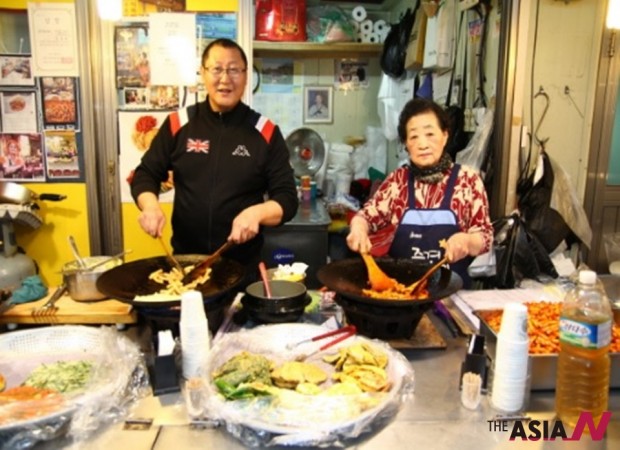
K-snack to whet global appetite

At Jeong Wol-seon’s “tteokbokgi(떡볶이)” store in Tongin Market, northern Seoul, she sells a slightly different version of “tteokbokgi” or the spicy rice cake snack.
It’s a fried, spicy version without the soupy sauce. It’s also the one that John Kerry, U.S. secretary of state, picked up with a toothpick to taste while he was in Seoul in February.
There is a picture of Kerry at her small store. It’s lunch time Monday, and customers continue to line up, eager to consume the 3,000-won dish.
Jeong says that she packs slightly more for those who come far to taste the snack dish. The store only sells the rice-cake snack, “sundae” or blood sausage and “jeon” or pancakes.
Why doesn’t she expand?
“This tteokbokgi is not sweet, so it’s not a good idea to take it to large marts,” said Jeong.
For a small shop as hers to expand, help would be needed, as in the case of “bindaetteok” or mung bean pancake from Gwangjang Market in Jongno, downtown Seoul that enlisted the help of E-Mart.
“Sunhee’s Bindaetteok” is a popular food that foreign tourists come to enjoy including the likes of the American director Tim Burton.
Neither sweet nor spicy, the affordable 4,000-won pancake mixes ground mung bean and kimchi to yield a soft and chewy pancake. It’s so popular that by lunchtime, people line up and the supermarket chain has supplied frozen versions to its outlets. In March, its founder Choo Seong-ae and siblings attended the international food fair held in Tokyo to deliver the taste of the bindaetteok.
“Japanese tourists have been trekking to our store for years, so our booth did well at the fair,” said Choo Keun-sung, in charge of the business side and the youngest sibling of the store’s founder.
Choo said the store’s participation at the food fair is more an outcome of the government’s policy to have more conglomerates join hands with small businesses so that the two can grow together. Large supermart chains like E-Mart have cooperated with makers of chicken “gangjeong “ or fried chicken snack or “eomuk” or fish cakes.
“We’re not necessarily looking at the world market at large, but our products are selling in Japan, the United States and Asia,” Choo said.
His hesitancy is within context. To date, Korean food has largely been identified with “bulgogi” or barbecued beef, and “bibimbap” or rice mixed with vegetables. It’s also been promoted mainly by conglomerates such as CJ Foodville’s Bibigo, the mixed rice franchise also popular overseas.
But with more of the Korean snacks appearing in popular Korean dramas, like the tteokbokgi, pancakes and chicken with beer are appearing more on the menu. The Bibigo shop in London last December added the chicken and beer or “chimaek” on its list. After the rage of the television drama “My Love From the Star,” the mixed-rice dish franchise said that it has recently introduced it in its Chinese shops as of March.The company said that since then, the Bibigo stores inChina is selling about 100 of the chicken set menu in its China shops, and has plans to upgrade it so that it can be a full meal as well.
The Korea Agro-Fisheries Trade Corporation (aT) announced Monday that sales at Korean fried chicken shops in China increased by 30 percent since the drama. Korean instant noodles also increased 60 percent of its sales through China’s biggest online shopping mall Taobao, aT said.
Based on these encouraging statistics, aT said that it will strengthen cooperation with drama-makers so that Korean food could be strategically exposed to overseas audience.
At the moment, it’s the big-sized firms or entities that are leading the export of Korean food by riding the hallyu wave. The firm’s scale allows them to strategically place their products in dramas and even respond to overseas customer complaints.
Whether much smaller firms or shops can go global on its own initiative still remains a big question, but food-makers such as Choo are confident that palatability will expand their fanbase.
“We are confident about the taste,” he said. By Kim Ji-soo, The Korea Times


